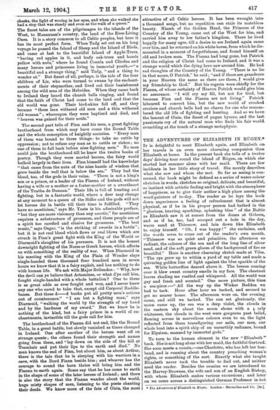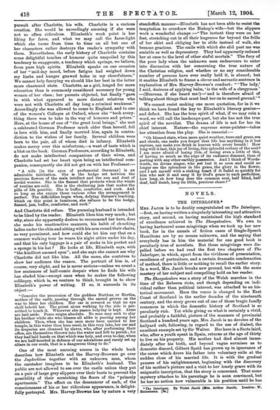THE ADVENTURES OF ELIZABETH IN RrGEN.* IT is delightful to
meet Elizabeth again, and Elizabeth orb her travels is an even more charming companion than Elizabeth at home. In the present book she tells of a twelve days' driving tour round the island of Riigen, on which she started last summer alone with her maid. There are few incidents in her little story of travel. She merely describes what she saw and whom she met. So far as seeing is con- cerned, the book might be defined as a series of water-colour sketches in words, sketches so original, delicate, and beautiful,. so instinct with artistic feeling and bright with the atmosphere- of happiness, as to give their author a high place among th& word-painters of to-day. The reader as he lays the book down experiences a feeling of refreshment that is almost physical, as if he in his proper person had bathed in the "glorious, heaving, sparkling, splashing blue" of the Bahia as Elizabeth saw it at sunset from the dunes at Giihren, and as if he, too, had scooped out a hole in the dry,. warm sand at Thiessow, and lain down like Elizabeth to enjoy himself. "Oh, I was happy ! " she exclaims, and the words seem to come out of the reader's own mouth. " Thiessow was so quiet and primitive, the afternoon so- radiant, the colours of the sea and of the long line of silver sand, and of the soft green gloom of the background of firs so beautiful." Here is another charming sketch made at Vilm. "The rye grew up to within a yard of my table and made a quivering golden line of light against the blue sparkle of the sea. White butterflies danced above it. The breeze coming- over it blew sweet country smells in my face. The chestnut leaves shading me rustled and whispered. All the world was gay and fresh and scented." One more picture, this time a sea-piece :—" All the way up the Wieker Bodden we had to tack. Hour after hour we tacked, and seemed to get no nearer home. The afternoon wore on, the evening came, and still we tacked. The sun set gloriously, the moon came up, the sea was a deep violet, the clouds in the eastern sky about the moon shone with a p any whiteness, the clouds in the west were gorgeous past belief, flaming across in marvellous colours even to us, the light reflected from them transfiguring our sails, our men, our whole boat into a spirit ship of an unearthly radiance, bound for Elysium, manned by immortal gods."
To turn to the human element in the new " Elizabeth " book. She is not long alone with her maid, the faithful Gertrud. She soon meets a cousin,—one Charlotte, who has left her hus- band, and is running about the country preaching woman'a. rights, or something of the sort. Exactly what she taught Elizabeth never took the trouble to find out, and neither need the reader. Besides the cousins we are introduced to the Harvey-Brownes, the wife and son of an English Bishop, with whom Elizabeth makes various excursions ; and later on we come across a distinguished German Professor in hot
• The Adventures of Elisabeth in RUgen. London : Macmillan and Co. Dal
pursuit after Charlotte, his wife. Charlotte is a curious creation. She would be exceedingly amusing if she were not so often ridiculous. Elizabeth's weak point is her liking for farce, and what we may call the farce-light which she turns from time to time on all but one of her characters rather destroys the reader's sympathy with them. Nevertheless, the early history of Charlotte contains some delightful touches of humour quite unspoiled by this tendency to exaggerate, a tendency which springs, we believe, from pure high spirits. Elizabeth speaks on one occasion of her "mid-day mood, before fatigue had weighed down my limbs and hunger gnawed holes in my cheerfulness." We cannot help fancying we should like her best in the latter more chastened state. Charlotte, as a girl, longed for more education than is commonly considered necessary for young women of her class ; her parents objected, but finally "gave in with what appeared to more distant relatives who were not with Charlotte all day long a criminal weakness."
Accordingly she was allowed to come to England, and to one of the women's Colleges at Oxford, where she "took every- thing there was to take in the way of honours and prizes."
Here, at the house of one of "the great local beings," she met a celebrated German Professor much older than herself, fell in love with him, and finally married him, again in contra- diction to the wishes of her family. Several children were born to the pair, all of whom died in infancy. Elizabeth makes merry over this misfortune,—a want of taste which is a blot on the book. German Professors, according to Elizabeth, 410 not make intellectual companions of their wives, and Charlotte had set her heart upon being an intellectual com- panion, consequently she did not get on with her Professor:—
" A wife [in the eyes of professorial Germany] is an admirable institution. She is the hedge set between the precious flowers of the male intellect and the sun and dust of sordid worries. She is the flannel that protects when the winds -of routine are cold. She is the sheltering jam that makes the pills of life possible. She is buffer, comforter, and cook. And so long as she enjoys these various rdles the arrangement is perfect. The difficulties begin when, defying Nature's teaching, which on this point is luminous, she refuses to be the hedge, flannel, jam, buffer, comforter, and cook."
And Charlotte did refuse. The pursuing husband is intended to be liked by the reader. Elizabeth likes him very much ; but why, since she apparently desires to recommend her hero, does she make his unattractive manners, his habit of ch ucking ladies under the chin and sitting with his arm round their chairs,
so very prominent, and how could she let him say that on a summer walking tour he wears his night attire under his day,
and that his only luggage is a pair of socks in his pocket and a sponge in his hat ? He looks at life, Elizabeth says, with "the kindliest amused eyes"; and she says she cannot see why Charlotte did not like him. All the same, she contrives to show her audience the reason. The portrait of him is, of course, very slight, and he is never serious—unless we count a few sentences of half-comic despair when be finds his wife has eluded him—except once when he makes the following soliloquy, which is, we venture to think, brought in to show Elizabeth's power of writing. If so, it succeeds in its
" Conceive the procession of the goddess Nerthus, or Hertha, mother of the earth, passing through the sacred groves on the way to bless her children. Her ear is covered so that no eye shall behold her. The priest alone walking by the side is per- mitted to touch it. Wherever she passes holyday is kept. Arms are laid aside. Peace reigns absolute. No man may seek to slay his brother while she who blesses all alike is passing among her -children. Then, when she has once more been carried to her temple, in this water thou here seest, in this very lake, her car and its draperies are cleansed by slaves, who, after performing their office, are themselves thrown into the water and left to perish ; for they had laid hands on that which was holy, and even to-day, when we are half-hearted in defence of our adorations and rarely set up altars in our souls, that is a dangerous thing to do."
One of the most amusing scenes in the whole book describes bow Elizabeth and the Harvey-Brownes go over the Tagdschloss together with an unknown man, whom the caretaker imagines to be Elizabeth's husband. The public are not allowed to see over the castle unless they put on a pair of large grey slippers over their boots to prevent the possibility of their scratching the floors of the "princely apartments." The effect on the demeanour of each, of the consciousness of his or her ridiculous appearance, is delight- fully portrayed. Mrs. Harvey-Browne has by nature a very
standoffish manner—Elizabeth has not been able to resist the
temptation to overdraw the Bishop's wife—but the slippers work a wonderful change :—" The instant they were on her feet, stretching out in all their hugeness far beyond the frills of her skirt and obliging her to slide instead of walk, she became gracious. The smile with which she slid past me was amiable as well as deprecatory. They had apparently reduced her at once to the level of other sinful mortals." The fury of the poor lady when the unknown man endeavours to enter into discussion with her concerning the true nature of the Christian religion, and whether or no any considerable number of persons have ever really held it, is absurd; but it enables Elizabeth to frame a clever and sarcastic sentence in explanation of Mrs. Harvey-Browne's conduct : "'The lady,' I said, desirous of applying balm, is the wife of a clergyman' —(Heavens, if she heard me and is therefore afraid of
talking about things that must lead her on to sacred ground." We cannot resist making one more quotation, for in it we think we have found the key to Elizabeth's literary genius—
and defect. She has the true spirit of what, if we may coin a word, we will call the landscape-poet, but she has not the true spirit of the novelist. The drama of life is not for her its chief interest. Nature—the supreme scene-painter—takes her attention from the play. She is unsocial :—
"Oh blessed state, when mere quiet weather, trees and grass, sea and clouds, can make you forgot that life has anything in it but rapture, can make you drink in heaven with every breath ! How long will it last, this joy of living, this splendid ecstasy of the soul ? I am more afraid of losing this, of losing even a little of this, of having so much as the edge of its radiance dimmed, than of parting with any other earthly possession. And I think of Words- worth, its divine singer, who yet lost it so soon and could no longer see the splendour in the grass, the glory in the flower, and I ask myself with a siTaring heart if it faded so quickly for him who saw it and sang it by God's grace to such perfection, how long, oh how long does the common soul, half blind, half deaf, half dumb, keep its little, precious share ? "











































 Previous page
Previous page